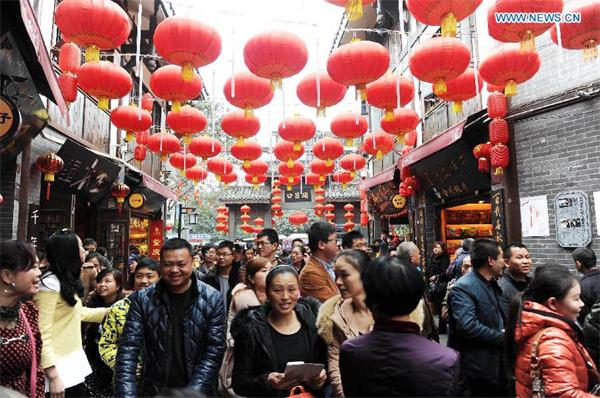Traditional New Year important in culture
Updated: 2015-02-26 08:15
(China Daily)
|
|||||||||||
 |
|
Tourists are seen on a street in Ciqikou Town, southwest China's Chongqing Municipality, Feb 20, 2015. According to local department, the town has received more than 90,000 tourists during the first two days of Chinese Lunar New Year holiday. Some regulations have been carried out to control the number of tourists. [Photo/Xinhua] |
What makes hundreds of millions of Chinese defy the transport crush and head home for the Spring Festival? A family reunion will probably be the answer almost every Chinese would give.
And behind this lies nostalgia for festivities experienced in the past, when the celebrations would feature the company of relatives and friends and home banquets. Convivial chats over drinks and perhaps the playing of mah-jong would often see in the coming year.
Yet, it has become clear that this simple festive spirit is becoming increasingly diluted. Many even worry that the old Spring Festival traditions will no longer be observed when the elder generations in a family pass away.
With the majority of families now having only one child, it would even be impossible for such a nuclear family to play mah-jong, which requires four, to say nothing of the traditional series of visits between family members that used to be such a major part of the festival.
What is driving these traditions away is the increasingly higher living standards people enjoy.
For many older Chinese, who used to lead hand-to-mouth lives, Spring Festival meant spending a year's savings to buy themselves new clothes and good food. Even for most middle-aged, and indeed those in their 30s, Spring Festival was always an occasion eagerly awaited when they were kids.
Now when edible treats and beautiful clothes are no longer a problem for many, Spring Festival no longer holds the same significance it used to.
And with text messages and micro text messages now the most common means of saying Happy New Year between friends and relatives, festival visits are becoming a thing of the past. And the likelihood of a family hosting a home banquet for friends or relatives is diminishing with each passing year.
Yet, the memories of what Spring Festival used to be like are still there. And when the festival is drawing near and the day to leave for home is coming, such memories can stimulate many to expect too much of the occasion. They then feel a strong sense of loss when they find the festival is not what they anticipated it would be.
The loss of many traditions is inevitable with China's transition from an agricultural society to an industrialized one. But it is imperative the traditional festival's cultural characteristics are maintained, and it remains a family reunion for remembering the past and mustering courage for the future.
Related Stories
New Year traditions lost 2015-02-25 08:23
Lunar New Year alive in London 2015-02-25 07:27
Jilin people have a thoroughly enjoyable New Year 2015-02-25 17:19
City leaders offer New Year greetings to the needy 2015-02-20 12:12
Today's Top News
Euro zone backs Greek aid extension
HK seeks fewer mainland visitors
Shooting kills eight in Czech town
European clubs want compensation over 2022 decision
China highlights dos, don'ts in intl relations
Through negatives, Frenchman brings 80s and 90s China back to life
Google teams up with 3 wireless carriers to combat Apple Pay
Vietnam's travel companies cash in on Lunar New Year holiday
Hot Topics
Lunar probe , China growth forecasts, Emission rules get tougher, China seen through 'colored lens', International board,
Editor's Picks

|

|

|

|

|

|





